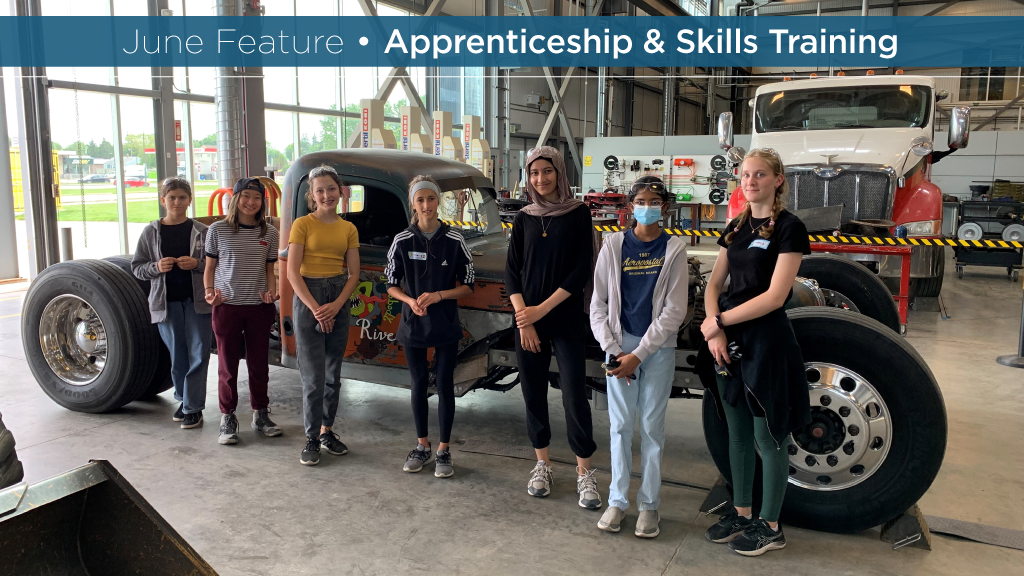Girls Exploring Trades and Technology (GETT) is celebrating its 25th anniversary this year.
Founded in 1999, GETT is a summer program at Red River College Polytech (RRC) in Winnipeg that introduces girls aged 12 to 14 to applied skills and technology careers.
“Women are very underrepresented in the skilled trades in Canada,” said Derek Kochenash, the dean of the school of skilled trades and technologies. “GETT is an opportunity for the girls to explore the skilled trades and get some experience doing such things as cutting, drilling and wiring.”
Program organizers say the early teen years are an important time for girls because they begin to make high school course decisions that affect future career choices.
GETT introduces girls to such trades as carpentry, sheet metal, piping, welding, robotics and automotive trades as realistic careers for them.
It also makes them aware of the importance of taking science, advanced math subjects and industrial arts in high school.
Three week-long camps take place in the first three weeks of July at RRC Polytech’s main campus in western Winnipeg.
“A total of 50 campers have registered this year,” said Kochenash. “There are four to six instructors from the college, some of whom are female. It’s an immersive experience and it’s been successful, because some of the campers have gone into the trades.”
Tuition, materials and PPE are provided at no cost, thanks to support from the Canerector Foundation.
The foundation was started in 2019 by Canerector, a group of over 50 companies that design and manufacture industrial products across a wide range of industries.
The Construction Foundation of BC (CFBC) is a registered Canadian charity that operates the Skills Ready program.
Skills Ready hosts presentations, events and workplace tours to help educators and career advisers introduce youth to careers in the skilled trades.
“Well over 20,000 youth have participated in Skills Ready programs since our launch in 2016,” said René Ragetli, CFBC’s director of project operations. “Since then we’ve connected with thousands of youth, developed four project books for tech ed teachers, and held hundreds of in-class, hands-on workshops.”
Outside of the school year, CFBC puts on summer camps across the province.
“This year we’re hosting camps in Quesnel, Fort Nelson, Victoria, Vancouver and Kitselas,” said Ragetli.
CFBC recently launched a new Skills Ready project called Build Green Together.
The program introduces high school students to education and employment pathways in construction that focus on how industry can help B.C. reduce carbon emissions.
Through a series of workshops, keynote talks, hands-on demonstrations and networking events, students are introduced to environmentally-focused careers in construction and the opportunities that are available to them in the workforce.
In Alberta, The Educational Partnership Foundation (TEPF) provides literacy and trades programs that “bridge the gap between educators and industry to elevate educational experiences.”
TEPF has partnered with several Alberta trade unions to offer the Introduction to Trades Summer Program, which is an internship that exposes students to industry environments, safe work practices and employment opportunities while they earn unpaid work experience credits.
Barbara Simic, president and CEO, said TEPF started the high school trades program in 2017 because of the high Alberta high school dropout rate as well as the shortage of young people entering the trades.
The program is offered to Grade 11 and 12 students in high schools in Edmonton and area, Innisfail/Red Deer and area and Calgary and area.
Simic said the program has been a great success, with a 98 per cent completion rate, and 90 per cent of those students either working in the trades or looking for work there.
David Ross, a registered clinical counsellor in Delta (B.C.) School District 37, said programs that introduce young people to the trades have value.
“Once young people are introduced to programs and have a chance to immerse themselves in a hands-on environment, it can often create an interest and desire to pursue these professions further,” said Ross.
Such lines of work as construction, welding, electrical and other vocational programs aren’t as attractive as university to many youth and their parents because society places more value on a university education, he said.
“But once students realize what the trades are really about, and they have the chance to perform work that brings satisfaction and pride, many become more interested,” said Ross.
Finally, he said, taking part in a hands-on program can bring out natural aptitudes and abilities that younger people didn’t realize they had.




Recent Comments
comments for this post are closed